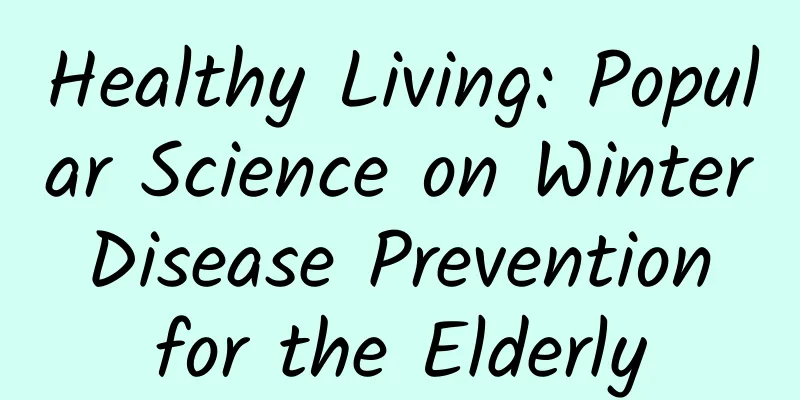Healthy Living: Popular Science on Winter Disease Prevention for the Elderly

|
Winter is characterized by low temperatures and large temperature differences between day and night, which reduces the body's resistance and increases the prevalence of diseases. In particular, the prevalence of diseases among the elderly in winter is significantly higher than that among young people. The reason is that the body's resistance gradually decreases with age, coupled with malnutrition, decreased tissue and organ function, etc. There are many types of diseases in the elderly in winter, with different causes, which have a serious impact on their daily lives. Some patients do not recover for a long time after becoming ill, which increases the burden on the body, reduces the quality of life, and can be life-threatening in severe cases. Winter is a season with a high incidence rate among the elderly, and it is also the main season for the elderly to die from diseases. Therefore, it is very important to understand the common diseases among the elderly in winter and master the knowledge of prevention. Common winter diseases among the elderly Common diseases in the elderly in winter include respiratory tract infection, fracture, constipation, gastrointestinal bleeding, cold, skin itching, myocardial infarction, cerebrovascular disease, etc. The elderly are prone to illness in winter because the weather becomes colder after entering winter, the temperature drops, the temperature difference between day and night is large, and the alternation of hot and cold can cause vascular spasm, high blood pressure, and increase the heart load. Respiratory diseases, digestive system diseases, etc. are also more likely to occur in winter, which is a season with a high incidence rate. Paying attention to the healthy life of the elderly, it is necessary to pay attention to the prevention of winter diseases, and it is very important to master the necessary prevention knowledge. The elderly should have a correct understanding of their physical condition and health, and have some knowledge of common winter diseases. After entering winter, they should prevent diseases in life, diet, exercise, medication, etc. to ensure physical and mental health. The children of the elderly need to understand the knowledge of winter disease prevention for the elderly, give them more care and care in life, create a good and comfortable living environment for them, reduce the incidence of winter diseases, and improve the quality of life. Winter disease prevention for the elderly 1. Respiratory tract infection Respiratory tract infection is the most common disease in the elderly in winter, which is related to their low immunity and poor resistance. After entering winter, the weather gradually becomes colder and the temperature difference between day and night is large. Some elderly people do not add or remove clothes in time, and do not keep warm in daily life. They catch a cold and have a fever, which directly affects the respiratory system, induces an inflammatory response, and leads to respiratory tract infection. The lung function of the elderly is reduced and their ability to resist cold is poor. The outdoor air temperature is low in winter, and it is easy to cause coughing after inhaling into the lungs. The elderly need to keep warm in winter, add or remove clothes in time, keep the head, neck, chest and back warm when going out, wear a mask, and avoid inhaling too much cold air. Reduce the number of times you go to public places and reduce the number of times you smoke. 2. Fractures The probability of fractures in the elderly in winter is very high, mainly due to falls. In the cold and wet weather in winter, especially in the north, the roads are slippery with snow after snowing in winter. The elderly have poor limb mobility and coordination, and are very likely to slip. In addition, the elderly generally have osteoporosis, and the probability of fractures caused by external forces after slipping is high. When the elderly go out in winter, it is best to be supported by family members or use a cane. In public places, you can walk by holding on to walls, handrails, etc. In addition, the elderly can buy non-slip shoes, slow down their walking speed, and choose places with good road conditions to walk. 3. Constipation Constipation is a very common disease among the elderly in winter. With the increase of age, the intestinal peristalsis function weakens and the muscle strength decreases, which has a direct impact on daily bowel movements. The weather is dry in winter. The elderly usually drink less water, eat less, have unbalanced nutrition, or eat vegetarian food for a long time, which will affect normal bowel movements. To prevent constipation, the main method is to adopt a dietary adjustment plan. In daily diet, you can appropriately increase the intake of high-fiber foods, eat more fresh vegetables and fruits, and consume oil in moderation, such as olive oil. The staple food can be whole grains, and the dishes are mainly fish and chicken. The elderly need to pay attention to the reasonable combination of diet, not be picky eaters, and have a balanced diet. 4. Gastrointestinal bleeding There is a certain probability that the elderly will have gastrointestinal bleeding in winter, which is related to the consumption of irritating foods and irregular meals. For example, when the elderly eat hot pot in winter, they eat more, which will increase the load on the gastrointestinal tract, thus stimulating gastrointestinal bleeding. The protective function of the digestive tract mucosa of the elderly is reduced, and it is easy to produce inflammation and ulcers under stimulation, causing bleeding. After the arrival of winter, it is necessary to strictly control the diet and reduce the consumption of irritating foods. In the diet, you can eat steamed bread, whole grains, etc. in moderation to protect the gastrointestinal tract. The elderly should also develop good eating habits, eat on time, and eat small meals frequently. 5. Colds After entering winter, the number of elderly people suffering from colds has increased sharply, and the incidence rate has increased. Due to the low temperature and dry air in winter, the pathogenicity of the virus that causes colds has increased, and the disease resistance of the upper respiratory tract of the elderly is relatively poor, which makes them very susceptible to virus invasion and illness. The elderly need to add or remove clothes in time in winter, keep themselves warm, and wear hats, gloves, scarves, etc. when going out. The elderly should not stay at home for a long time in winter. They should go out to breathe fresh air when the sun is sufficient and the weather is good, and do appropriate physical activities, such as square dancing, walking, Tai Chi, etc., to enhance their resistance, strengthen their bodies, and improve their resistance to colds. 6. Skin itching Elderly people are prone to skin itching in winter because their skin degenerates and atrophies with age, and the function of sebaceous glands declines, resulting in less sebum secretion. Winter weather is cold, the temperature is low, and the climate is dry. Elderly people’s skin lacks sufficient sebum protection, and their skin is very dry. They are very sensitive to external stimuli, causing skin itching. Elderly people need to strengthen skin care in winter. They can apply some moisturizing creams to moisturize the skin, increase the skin’s moisture content, and maintain normal skin oiliness. In daily diet, you need to pay attention to replenishing water, eat more fresh vegetables and fruits, and avoid or eat less spicy and irritating foods, such as peppers and garlic. 7. Myocardial infarction Winter is the main season for myocardial infarction in the elderly. The elderly have poor resistance and weak ability to resist cold. In a low-temperature environment, they are stimulated by cold, which causes vasoconstriction, increased blood viscosity, slowed blood flow, and easy formation of blood clots. In winter, the elderly need to add or remove clothes according to weather changes, keep warm when going out, have regular cardiovascular system examinations, and take thrombolytic and blood lipid regulating drugs under the doctor's advice to maintain blood circulation. Pay attention to the combination of work and rest in daily life, exercise appropriately, and family members can give full body massages at home to promote blood circulation. 8. Cerebrovascular disease The elderly are prone to cerebrovascular disease in winter. The low temperature in winter will cause the elasticity of the elderly's surface blood vessels to decrease and the peripheral resistance of the blood vessels to increase. The cold air can excite the elderly's sympathetic nerves, increase the secretion of adrenal cortex hormones, cause spasm and contraction of small arteries, and increase blood pressure. In a cold environment, the fibrinogen content in human blood increases, and the blood viscosity increases, which can easily cause thrombosis. The elderly should take medication under the advice of a doctor in winter, actively treat confirmed primary diseases, such as hypertension, diabetes, etc., pay attention to monitoring blood pressure and blood sugar, and review them on time. At the same time, they need to keep warm, maintain a positive and optimistic attitude, don't get angry easily, eat a light diet, quit smoking and limit alcohol, eat more vegetables and fruits, and keep bowel movements smooth. The incidence rate among the elderly is high in winter, and there are many types of diseases. The main causes of the disease are climate change, low temperature and large temperature difference. Effective prevention is needed based on the characteristics of the disease, and personal protection should be taken in terms of diet, psychology, exercise, life, keeping warm, medication, etc. to reduce the incidence rate. |
<<: How to win back your aunt after she ran away from home
>>: CNNBC: Facebook IPO User Survey
Recommend
Uterine contractions during early pregnancy
Uterine contractions can be divided into two type...
WeChat: In 2022, the number of monthly active users of WeChat Search has reached 800 million, a year-on-year increase of 54%.
Recently, the 2023 WeChat Open Course PRO started...
How long does it take for a woman to reach menopause?
Women will go through menopause when they reach a...
I have extreme pain in my lumbar spine during menstruation
The waist is very important for a person. Low bac...
Can I use Fengyoujing when I am pregnant?
We all know that Fengyoujing is a cooling medicin...
One line for eight days of delayed menstruation
Important reminder: Menstruation is a unique sexu...
Can I have sex when my period is almost over?
Menstruation is a normal phenomenon for women. Me...
Can pregnant women smell chrysanthemums?
In traditional Chinese medicine, chrysanthemum is...
Can sesame oil be used to treat cracked nipples?
Cracked nipples are one of the common diseases du...
Should there be a threshold between the living room and the balcony? What are the requirements for the threshold between the balcony and the living room?
Whether to use a threshold between the living roo...
How to delay your period for a few days
Menstruation occurs in every female after she rea...
What is the best way to remove stretch marks?
Stretch marks are a common type of wrinkles cause...
Is it necessary to wear socks during confinement in summer?
Confinement after childbirth is a tradition in my...
Drinking has these harmful effects on the liver? Do you still dare to drink?
Recently, the Second Department of Hepatology of ...
Red spots on pregnant women
If pregnant women develop red spots on their bodi...









